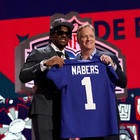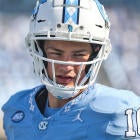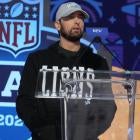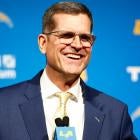The biggest details remaining in the once-seemingly unfathomable college football playoff are: who is actually on the selection committee and the criteria it will use to determine the four teams that get picked.
Last month at the annual BCS meetings in Pasadena, Calif., executive director Bill Hancock acknowledged there was a lot discussed about the makeup of the committee but nothing has been decided. The feeling is that the committee will have between 15 and 20 members.
The trickiest part for the sport's power brokers appears to be finding qualified people who are willing to take part in the process -- and deal with the scrutiny that is sure to come their way. After all, choosing between teams No. 4, No. 5 and No. 6 will be a lot thornier than sorting out basketball teams slotted somewhere in the 60s. Even gauging who is "qualified" triggers debate.
| More on college football |
| Column |
  |
| Related links |
| Video |
| More college football coverage |
Two weeks ago in Phoenix, where dozens of coaches and athletic directors took part in a variety of meetings held at the Arizona Biltmore, a typical reaction when certain AD were asked if they'd be interested in being on the selection committee wasn't just, "No, thanks." It was, "Oh, hell no."
The skepticism that the committee members will face is perceived biases. One person I figured sounded like an ideal candidate for the committee is Bill Byrne, since he served as the AD at schools that are now in the SEC (Texas A&M), Big Ten (Nebraska) and Pac-12 (Oregon). Byrne retired from A&M in 2012.
Byrne said he would be open to the possibility and thinks it'd be "fun" but added that at this point it's really difficult to understand exactly what's involved in being part of the selection committee.
"You always want to help your profession," he said. "The thing that you need to be careful of is there's no definition of what you're going to be doing. It's hard to jump on to something when you don't know what it is, so until they get some shape to this, I think almost anyone would have some question of what they're going to be getting involved with.
"The great thing about it is you're back involved in college football. That's the plus. The minus is you don't know what you're involved with. I've watched what happened to some of those fellas and gals on the basketball committee; they gave up about two months of their lives to do it. There's no meat on the bones right now."
The solution Byrne thought made the most sense to handle the selection committee was voiced in an article last week in the Lincoln Journal Star. Former Nebraska coach Tom Osborne made the case to Steve Sipple why college football's "Legends Poll" should be used. That poll consists of 17 former coaches, 15 of whom are in the College Football Hall of Fame.
"I recommended to Bill [Hancock] that they take a look at the coaches serving on the Legends Poll right now," Osborne told Sipple.
The Legends Poll was established in 2005. Osborne took part in it for three years.
"Each week, they would send us DVDs of the top games," he said. "So you'd get eight to t0 10 DVDs. They sent you a video player. You could sit there and really study the games."
The coaches on Mondays would gather for a teleconference, which lasted up to two hours, Osborne said.
"Each coach would talk about the game he had gone to the previous Saturday, and also what he'd seen on video," Osborne said. "I was impressed by the fact they seemed to be objective. It wasn't like R.C. was pushing Texas A&M, or Gene Stallings was pushing Alabama. They were just talking about strengths and weaknesses of teams in their area, and teams they'd seen."
Osborne also dismissed the skepticism that coaches taking part in the poll might be prone to biases.
"I thought the discussions were pretty objective and pretty dispassionate," Osborne said. "I heard coaches say things about their former school that weren't highly complimentary. They might say, 'We just can't play defense this year.' Or, 'We're pretty good overall but we don't have a quarterback.'
"I didn't hear anybody trying to pump up their school to the other coaches. They were pretty blank, pretty blunt."
Byrne said from his experiences of dealing with coaches for some four decades, he agrees with Osborne's assertion.
"I know how dispassionate and how knowledgable they can be," he said. "I've dealt with coaches for a long time. They can be brutally honest in private.
"I like the idea of having coaches doing it. They see things that most of us don't see. And the more I've thought about [the idea of old coaches being on the selection committee], the more it makes sense to me."
I suspect if the old coaches were the choice to man the selection committee, you'd find a questionable ranking or two at some point. (In the final Legends Poll for the 2012 season, Georgia cracked the top two on just three ballots. One was from former longtime UGA coach Vince Dooley; another was from Bobby Bowden, who mentored Bulldogs coach Mark Richt in their FSU days, and the third was from former Syracuse coach Dick MacPherson.) But looking at past results, the Legends poll was nowhere as dubious as the Coaches Poll, where most involved have too much invested for it to have ever been thought a good idea.
I'll admit in the past few months I've come around on the idea as having the old coaches involved in this process, for many of the reasons Osborne and Byrne pointed out. Of course, you're not going to ever be able to please everybody. And it's human nature for folks to be suspicious, especially these days where the Internet tends to breed cynicism. But scrutiny and the spotlight often helps keep folks on their toes.
One of the best things I heard at those BCS meetings last month was when SEC commissioner Mike Slive, when asked about the selection committee process, said that "transparency is something very important to us." Hopefully, that wasn't just press conference chatter. Pride and the responsibility to do the best they can for the process should, you hope, be the driving force here.




















